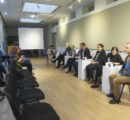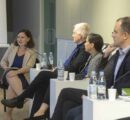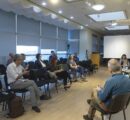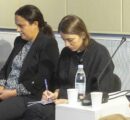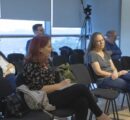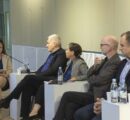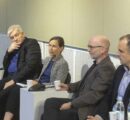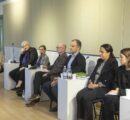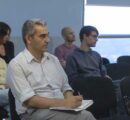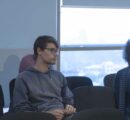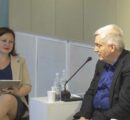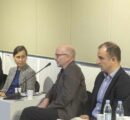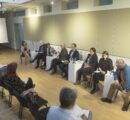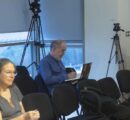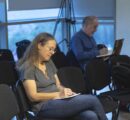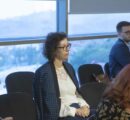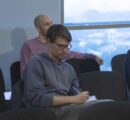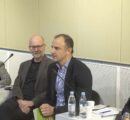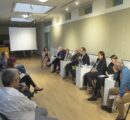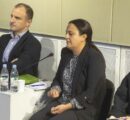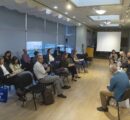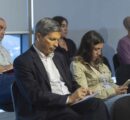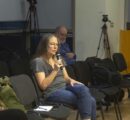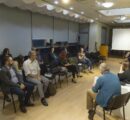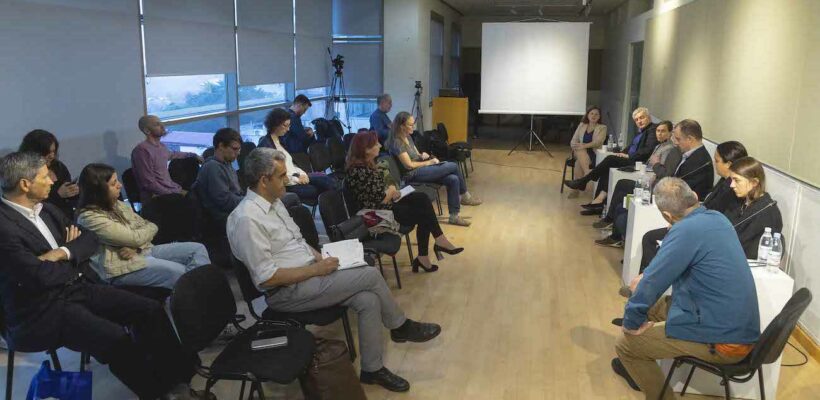
Shaping the Periphery and Enabling Movement: Highlights From Recent Conference
3 min readYEREVAN, Armenia — On October 3-5, the conference on “Shaping the Periphery, Enabling Movement — Infrastructure in the Caucasus From the Early 19th Century to the Late Soviet Period” was held in Armenia. The event was organized by Dr. Arpine Maniero of Collegium Carolinum Munich and Dr. Helena Holzberger of the Max Weber Foundation Branch Office, Tbilisi, in collaboration with Yerevan State University (YSU) and the American University of Armenia (AUA) College of Humanities and Social Sciences (CHSS). The conference culminated in a roundtable discussion at AUA moderated by Dr. Holzberger, Assistant Professor at Ludwig Maximilian University of (LMU) Munich.
The conference kicked-off at the YSU Faculty of History. In his opening remarks, CHSS Dean Dr. Hagop Yacoubian emphasized the invaluable opportunity the conference offered to explore potential future collaborations to advance existing associations among participants to more dynamic partnerships. Additionally, he highlighted AUA’s unwavering commitment to interdisciplinary research and its vital influence in addressing complex and ill-defined problems at the local, regional, and global levels.
During the conference, the participating scholars engaged in a thought-provoking discussion about creating a collaborative infrastructure between Western and South Caucasian scholars and academic institutions. This dialogue underscored the potential for cooperation between Armenian and Georgian educational institutions, including the feasibility of offering joint or dual-degree programs, fellowship initiatives, summer schools, and other activities collaborated between Georgian and Armenian institutions with the support of qualified professionals from both countries.
Dr. Sandra Dahlke, head of the German Historical Institute in Moscow, introduced her foundation as the umbrella organization pooling 11 humanities and social sciences research institutions. She also pointed out the current limitations Western researchers have in accessing Russian archives, posing significant challenges of conducting research related to the Soviet Union. She emphasized that greater knowledge about Russia, Ukraine, and Georgia would enhance the quality of research in topics relevant to these countries.
Dr. Oliver Reisner, professor in European and Caucasian Studies at Ilia State University in Tbilisi, noted the scarcity of epistemological studies in Georgian historiography, particularly regarding the influence of the political environment on the production of historical knowledge. There is more significant cooperation in other fields, such as anthropology and ancient history.
Dr. Andreas Renner, professor of Eastern European Studies and chair of Russia and Asia Studies at LMU Munich, encouraged the development of a collaborative infrastructure through organized workshops and encouraging students and Ph.D. candidates to work jointly on future research projects. He emphasized the advantages of integrating the Caucasus region more closely with periphery countries with a colonial structure, cause, and resistance, and studying the interconnections among them, using the expertise of historians from Armenia and Georgia.
Dr. Vahram Ter-Matevosyan, associate professor and assistant to the president on academic affairs at AUA, introduced the University and discussed its programs, student population, and plans for future growth. He stressed the significant impact of AUA’s scholarly output and highlighted the country’s need for historical studies conducted from a fresh conceptual perspective, distinct from the legacy of the Soviet framework. Furthermore, he emphasized the importance of establishing sustainable university-to-university cooperation with Georgia to facilitate research endeavors.
Dr. Edita Gzoyan, deputy scientific director at the Armenian Genocide Museum in Yerevan, made a presentation addressing the international visibility of Armenian journals. She pointed out that many scientific traditions in Armenia were inherited from the Soviet Union, especially in the field of social sciences. Despite the presence of 122 journals in Armenia, with 3,000 researchers working with these journals, the real issue is that most of these publications are in Armenian, which limits their visibility. She also highlighted that only a tiny percentage of the scientific community in the Armenian diaspora reads Armenian sources.
Tamar Qeburia, a Ph.D. candidate in history at Ilia State University and the German University of Göttingen, discussed two parallel processes in her field. The first relates to post-Soviet history and the influence of the Soviet infrastructure on Georgian scholars. The second involves reexamining traditional historiographical methodology, with both processes playing a crucial role in shaping history in peripheral regions. Qeburia expressed concern that the focus on empirical research in peripheries might overshadow the exploration of the theoretical and conceptual levels.
Dr. Vahagn Poghosyan, co-founder of Instigate Academy, described its mission to bridge the needs of the country and the government with academic offerings. He stated that while Armenia boasts a robust high-tech sector that serves foreign companies, it often misses out on local projects. Instigate is working to improve library management software in collaboration with Armenian national library professionals, with the potential to create a globally applicable library management product.
The conference also included discussions on the necessity of using Armenian sources to validate the region’s history, especially in relation to the Ottoman Empire, while emphasizing the importance of making sources publicly accessible for verification purposes. The conference concluded with considerations of expanded cooperation.
Refer to the recording for a comprehensive discussion.
Founded in 1991, the American University of Armenia (AUA) is a private, independent university located in Yerevan, Armenia, affiliated with the University of California, and accredited by the WASC Senior College and University Commission in the United States. AUA provides local and international students with Western-style education through top-quality undergraduate and graduate degree and certificate programs, promotes research and innovation, encourages civic engagement and community service, and fosters democratic values. AUA’s Office of Development stewards the University’s philanthropic efforts exclusively for educational purposes.

